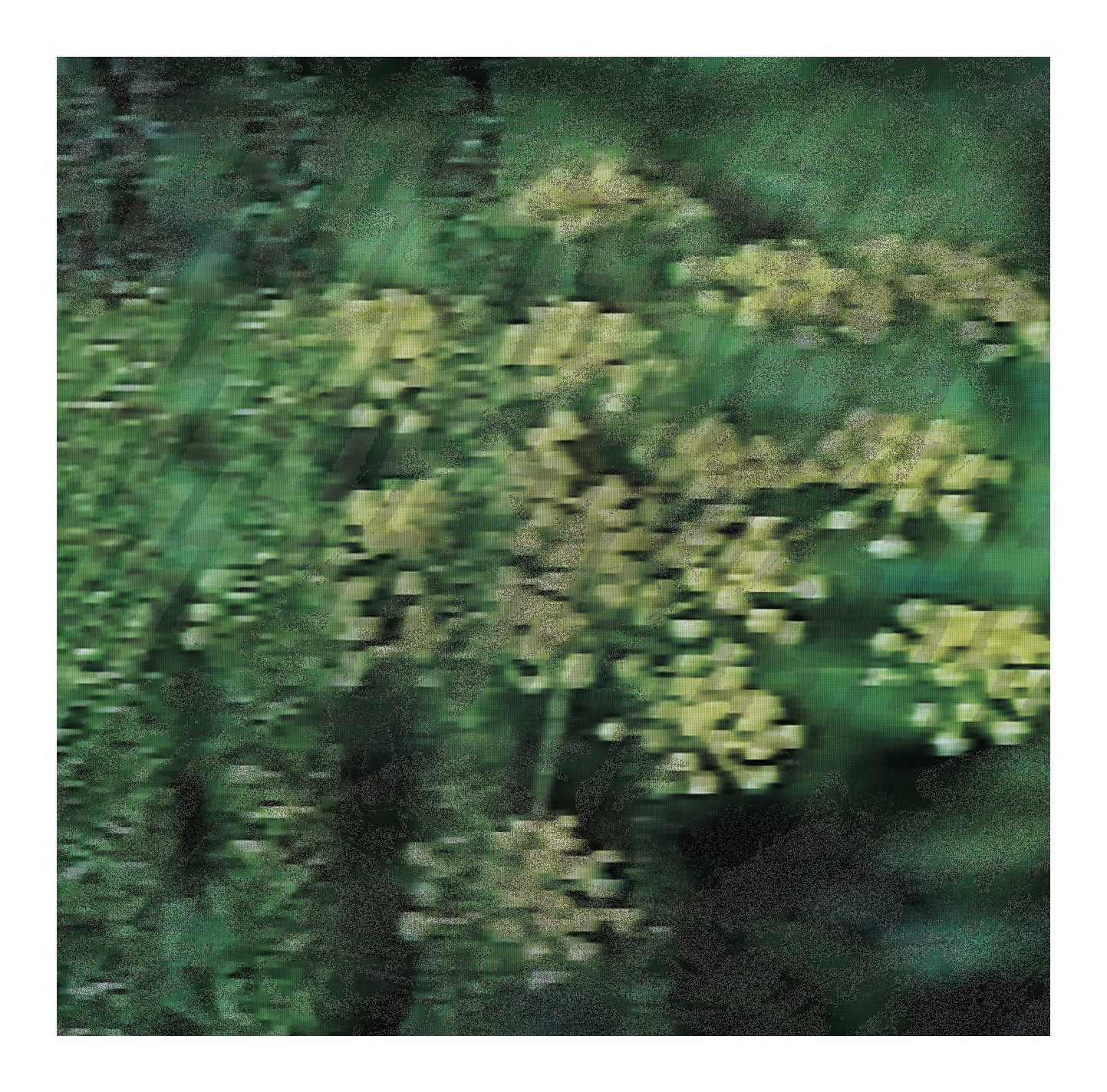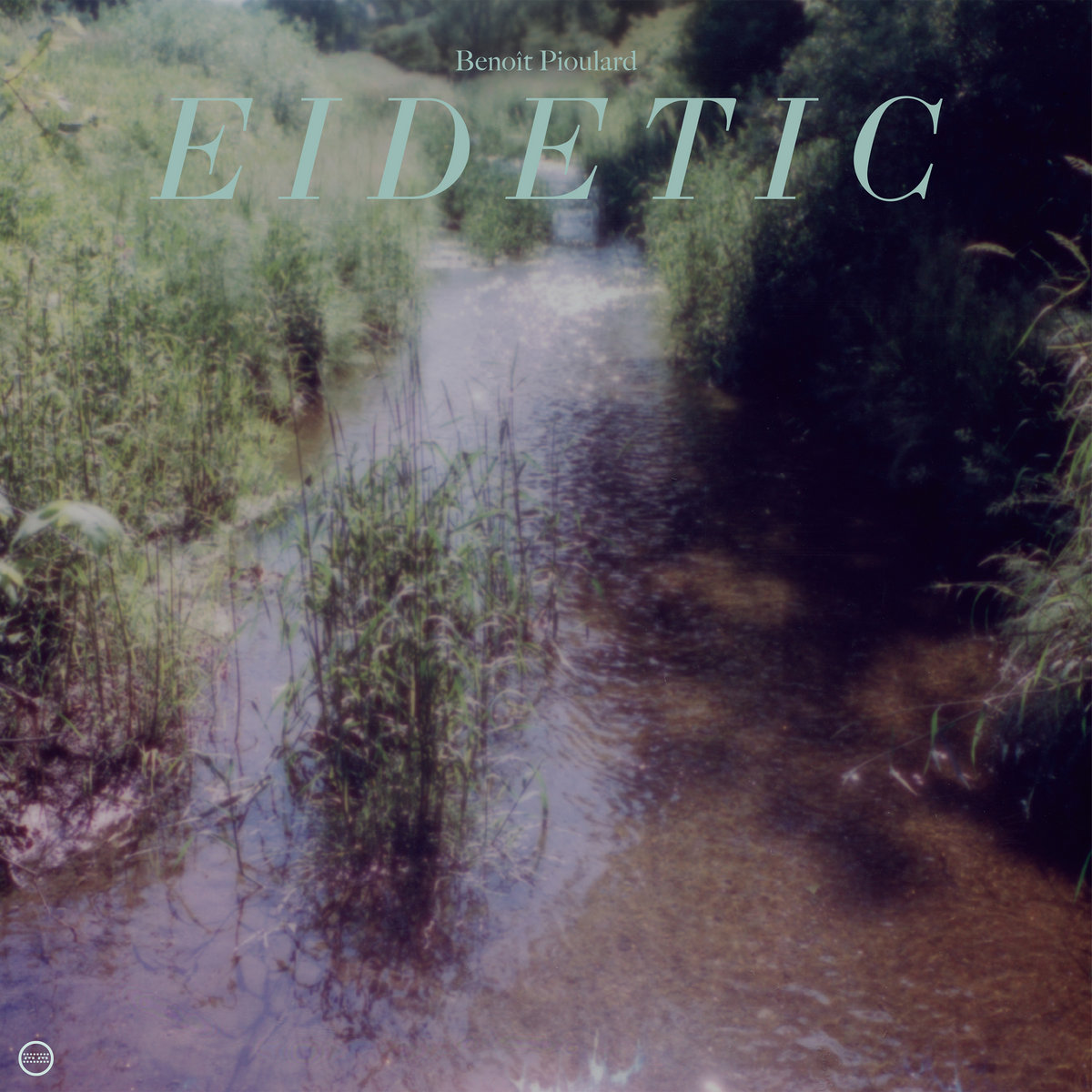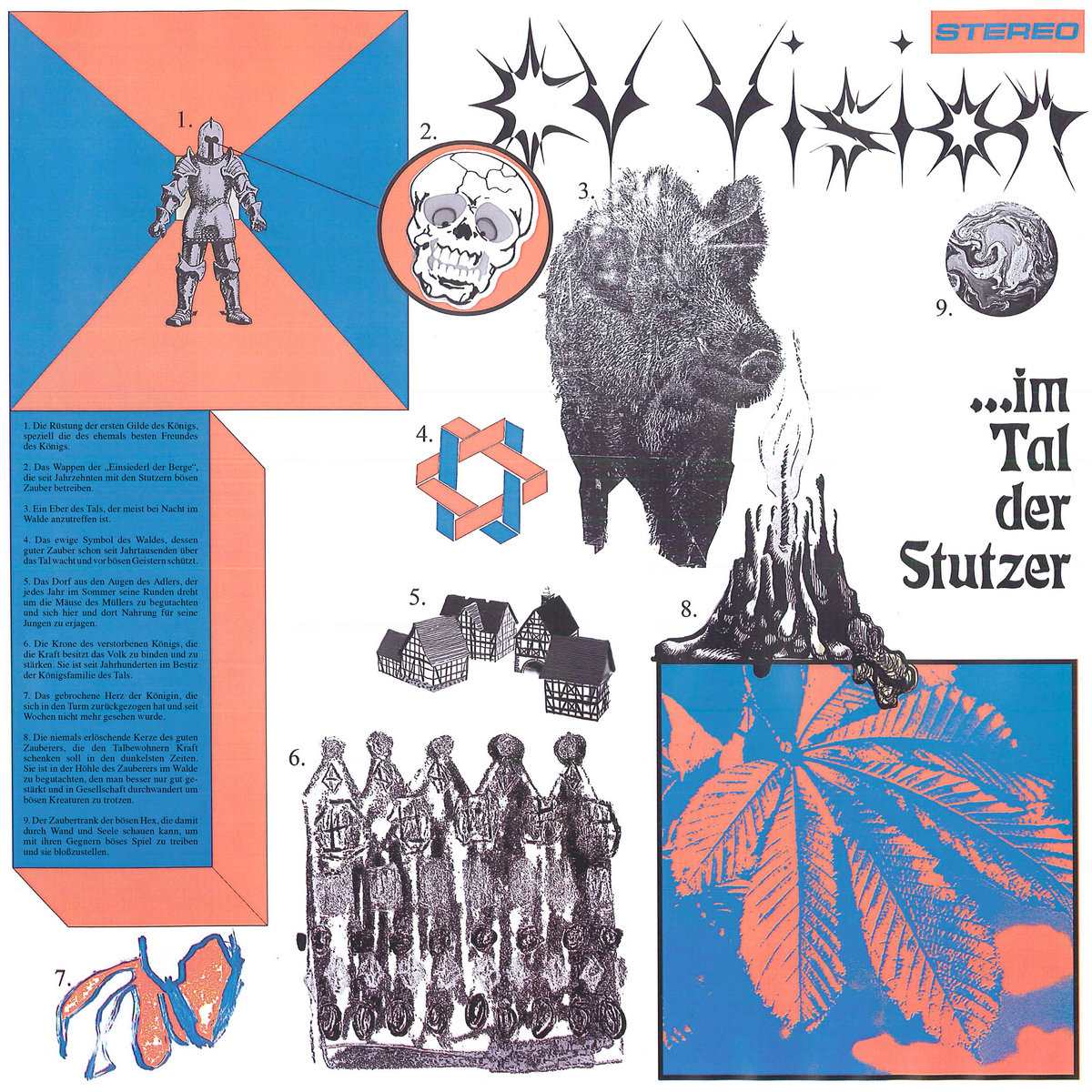 The latest cassette from the enigmatic duo Zizia (astrologer Amber Wolfe and natural scientist Jarrod Fowler) is intentionally ambiguous just from its presentation. No information presented within the tape itself, its neon green case covers a blurry photo of the Zizia flower and an intricately printed abstract image on the cassette shell, without a single bit of text included on either. A quick search online finds a website that offers details, listings of insects, plants, and artists that serve only to confound more than clarify. The self-identified concept of anti-musicology is apparent, however, and results in a complex and diverse suite of two lengthy noise works.
The latest cassette from the enigmatic duo Zizia (astrologer Amber Wolfe and natural scientist Jarrod Fowler) is intentionally ambiguous just from its presentation. No information presented within the tape itself, its neon green case covers a blurry photo of the Zizia flower and an intricately printed abstract image on the cassette shell, without a single bit of text included on either. A quick search online finds a website that offers details, listings of insects, plants, and artists that serve only to confound more than clarify. The self-identified concept of anti-musicology is apparent, however, and results in a complex and diverse suite of two lengthy noise works.
Split into two 18-minute segments, each covering half of the tape, the first immediately explodes with an intense blast of noise that quickly recedes to allow sustained tones and metallic rattling to fade in. Wolfe and Fowler utilize consistent sonic building blocks throughout, but layer them in what seems to be superficially sounds like chaotic and erratic structures, but extremely complex. Digital stuttering and metallic pinging noises appear throughout, the use of cymbals being the only easily identifiable element from the list provided via the release's website. Noise surges and drops, with insect and field recordings cast atop murky textures.


 These two albums from Seah, also known as multimedia artist and philosopher Chelsea Heikes, seemingly draw from different elemental categories, which ends up setting the foundation for the sounds contained within. The first, Conduits of the Hydrosphere, clearly draws from water while Clouds and Spectres is appropriately expansive, vapor-like, and ghostly at times. Released separately, they feel like complementary works that act as variations on sonic exploration.
These two albums from Seah, also known as multimedia artist and philosopher Chelsea Heikes, seemingly draw from different elemental categories, which ends up setting the foundation for the sounds contained within. The first, Conduits of the Hydrosphere, clearly draws from water while Clouds and Spectres is appropriately expansive, vapor-like, and ghostly at times. Released separately, they feel like complementary works that act as variations on sonic exploration. Back in 2019 Benoit Pioulard (Thomas Meluch) issued Sylva—an album full of abstract hyper-saturated lo-fi drone-pop sonic textures, which came with an 84 page collection of nature photographs in a linen book. Two pieces with vocals stood out: the brilliantly Bibioesque "Keep" and the less jangly but equally catchy "Meristem." These songs could not have been more appealing to me if Meluch had somehow used a machine to extract my personal dream essence as I slept. Naturally, I promptly forgot to write anything about Sylva, but Eidetic is a leap forward, with more vocals, so I'm glad I kept my powder dry.
Back in 2019 Benoit Pioulard (Thomas Meluch) issued Sylva—an album full of abstract hyper-saturated lo-fi drone-pop sonic textures, which came with an 84 page collection of nature photographs in a linen book. Two pieces with vocals stood out: the brilliantly Bibioesque "Keep" and the less jangly but equally catchy "Meristem." These songs could not have been more appealing to me if Meluch had somehow used a machine to extract my personal dream essence as I slept. Naturally, I promptly forgot to write anything about Sylva, but Eidetic is a leap forward, with more vocals, so I'm glad I kept my powder dry. Every so often a beautifully flawed pseudo-concept album gets released which it is almost a sin to try to describe. So it is with this absolutely mesmerizing record, a taste-smashing, fabulously old-fashioned, wobbly blitzkrieg of slippery, retro-futuristic, prog rock precision. As a rule I try to avoid describing music by talking about other music the reader may or may not have heard, but the gloves are coming off for this one. Imagine if modern psych groups weren't so one-paced, if Barclay James Harvest had a wah wah pedal and enjoyed fiddling with tape speeds, if Yes were fronted by Serge Gainsbourg or had a sense of humor, if The Opium Warlords and Bo Hansen joined The Mike Sammes Singers; and it all sounded perfectly natural. Juxtaposition and incongruity are at the heart of The Valley of The Dandies: a wonderfully unpredictable recording which manages to sound deliberately dated, and also touches on mythical themes ("explored" would be an exaggeration) but not in a po-faced or over-referential manner. The music is sometimes grandiose but CV Vision does not portray by resorting to a dull slow burn plodding pace. These tunes are amusing, bright, clever, and dynamic, the lyrics intriguingly clumsy but yet light and unobtrusive. There is an unknowable quality to this album, though; and a certain confidence in its completeness. It can not be reduced to a few neat genres, has a rich complexity but never sounds cluttered or gets bogged down. This is a real gem: clean, clear and valuable. It may become a cult classic or merely prove to be a refreshing oddity. Either way I played this thing through five times without a break!
Every so often a beautifully flawed pseudo-concept album gets released which it is almost a sin to try to describe. So it is with this absolutely mesmerizing record, a taste-smashing, fabulously old-fashioned, wobbly blitzkrieg of slippery, retro-futuristic, prog rock precision. As a rule I try to avoid describing music by talking about other music the reader may or may not have heard, but the gloves are coming off for this one. Imagine if modern psych groups weren't so one-paced, if Barclay James Harvest had a wah wah pedal and enjoyed fiddling with tape speeds, if Yes were fronted by Serge Gainsbourg or had a sense of humor, if The Opium Warlords and Bo Hansen joined The Mike Sammes Singers; and it all sounded perfectly natural. Juxtaposition and incongruity are at the heart of The Valley of The Dandies: a wonderfully unpredictable recording which manages to sound deliberately dated, and also touches on mythical themes ("explored" would be an exaggeration) but not in a po-faced or over-referential manner. The music is sometimes grandiose but CV Vision does not portray by resorting to a dull slow burn plodding pace. These tunes are amusing, bright, clever, and dynamic, the lyrics intriguingly clumsy but yet light and unobtrusive. There is an unknowable quality to this album, though; and a certain confidence in its completeness. It can not be reduced to a few neat genres, has a rich complexity but never sounds cluttered or gets bogged down. This is a real gem: clean, clear and valuable. It may become a cult classic or merely prove to be a refreshing oddity. Either way I played this thing through five times without a break! The latest ambitious durational epic from the Opalio brothers is thankfully not nearly as daunting as its 15-disc physical form suggests, as RINASCIMENTO ("Renaissance") is composed of 15 movements of varying lengths ranging from 5 to 40 minutes. The reasoning behind the unusual format is arguably twofold, as the Opalios' belief that "each sound claims its own space" is extended to dedicate a full disc to each movement and listeners are invited to "subvert the order" to make use of "random/chance operation à la Cage." There is an additional piece to the puzzle as well, however, as the handcrafted box and CD-R format were deliberately chosen as a return to MCIAA's "radical DIY" origins and as a pointed commentary on underground music's current maddening dependence on vinyl pressing plants and predatory corporations. Unsurprisingly, the primary appeal of RINASCIMENTO is the same as that of every other multi-hour MCIAA tour de force: it is a sustained and mind-altering plunge into otherworldly psychedelia that abandons nearly all earthbound notions of harmony, melody, structure, and instrumentation (and that is not an exaggeration). While the brothers' sonic palette will be a familiar one for longtime MCIAA fans (being a two-person real-time "spontaneous composition" project has some limitations), RINASCIMENTO is nevertheless one hell of a statement, as it collects the duo's most revelatory flashes of inspiration from an entire year of recordings (several of which capture the duo in peak longform form).
The latest ambitious durational epic from the Opalio brothers is thankfully not nearly as daunting as its 15-disc physical form suggests, as RINASCIMENTO ("Renaissance") is composed of 15 movements of varying lengths ranging from 5 to 40 minutes. The reasoning behind the unusual format is arguably twofold, as the Opalios' belief that "each sound claims its own space" is extended to dedicate a full disc to each movement and listeners are invited to "subvert the order" to make use of "random/chance operation à la Cage." There is an additional piece to the puzzle as well, however, as the handcrafted box and CD-R format were deliberately chosen as a return to MCIAA's "radical DIY" origins and as a pointed commentary on underground music's current maddening dependence on vinyl pressing plants and predatory corporations. Unsurprisingly, the primary appeal of RINASCIMENTO is the same as that of every other multi-hour MCIAA tour de force: it is a sustained and mind-altering plunge into otherworldly psychedelia that abandons nearly all earthbound notions of harmony, melody, structure, and instrumentation (and that is not an exaggeration). While the brothers' sonic palette will be a familiar one for longtime MCIAA fans (being a two-person real-time "spontaneous composition" project has some limitations), RINASCIMENTO is nevertheless one hell of a statement, as it collects the duo's most revelatory flashes of inspiration from an entire year of recordings (several of which capture the duo in peak longform form). This is the second solo album from NYC-based violist/composer/musicologist Annie Garlid and it borrows its name from the Greek word for "place." Notably, Garlid moved back to the US in 2018 after spending a decade in Europe (playing viola in a German opera orchestra, among other things) and that return to her home country unsurprisingly stirred up some deep and unfamiliar thoughts and feelings. Those ruminations directly inspired Topos conceptually, as the album is a meditation on the "simultaneous familiarity and foreignness" of Garlid's surroundings and her entanglement "with a place that was both in her memory and in front of her eyes." Regardless of its inspirations, Topos is a very different (and stronger) album than its predecessor United, as Garlid's medieval and baroque influences are newly downplayed in favor of a more sensuous, hallucinatory, and vocal-centric vision. While that transformation makes a lot of sense given Garlid's work with artists like Caterina Barbieri, Holly Herndon, Emptyset, and ASMR artist Claire Tolan, her assimilation of those disparate influences is impressively seamless and inventive, as Topos feels like the blossoming of a compelling and distinctive new vision.
This is the second solo album from NYC-based violist/composer/musicologist Annie Garlid and it borrows its name from the Greek word for "place." Notably, Garlid moved back to the US in 2018 after spending a decade in Europe (playing viola in a German opera orchestra, among other things) and that return to her home country unsurprisingly stirred up some deep and unfamiliar thoughts and feelings. Those ruminations directly inspired Topos conceptually, as the album is a meditation on the "simultaneous familiarity and foreignness" of Garlid's surroundings and her entanglement "with a place that was both in her memory and in front of her eyes." Regardless of its inspirations, Topos is a very different (and stronger) album than its predecessor United, as Garlid's medieval and baroque influences are newly downplayed in favor of a more sensuous, hallucinatory, and vocal-centric vision. While that transformation makes a lot of sense given Garlid's work with artists like Caterina Barbieri, Holly Herndon, Emptyset, and ASMR artist Claire Tolan, her assimilation of those disparate influences is impressively seamless and inventive, as Topos feels like the blossoming of a compelling and distinctive new vision. Just about anything which bucks stereotypes, and the more effortlessly the better, is usually fine and dandy with me. The notion of a sustained outbreak of surrealism down in Alabama is therefore beyond delicious. I say this because there's a definite sense in which Turner Williams Jr. is following in the rambling loose limbed footsteps of such musicians as Ron Pate, Fred Lane, LaDonna Smith, and particularly Davey Williams, who studied with Johnny Shines and was part of the whole Raudelunas Pataphysical Revue scene - playing alto and guitar on such pieces as "The Lonely Astronaut" and "Concerto For Active Frogs''. Let me say here that the origin of pataphysics is perhaps best left to another time, since Alfred Jarry's absurdity and all that merde (absinthe-fueled and otherwise) simply cannot be skimmed over.
Just about anything which bucks stereotypes, and the more effortlessly the better, is usually fine and dandy with me. The notion of a sustained outbreak of surrealism down in Alabama is therefore beyond delicious. I say this because there's a definite sense in which Turner Williams Jr. is following in the rambling loose limbed footsteps of such musicians as Ron Pate, Fred Lane, LaDonna Smith, and particularly Davey Williams, who studied with Johnny Shines and was part of the whole Raudelunas Pataphysical Revue scene - playing alto and guitar on such pieces as "The Lonely Astronaut" and "Concerto For Active Frogs''. Let me say here that the origin of pataphysics is perhaps best left to another time, since Alfred Jarry's absurdity and all that merde (absinthe-fueled and otherwise) simply cannot be skimmed over. This is the fifth album of traditional folk tunes which Alasdair Roberts has issued. He has also released several albums of his own compositions and it is a mark of his skill that it is pretty much impossible to tell the difference, and to know whether songs are his own imaginings or not. All share an erudite sensibility, often mixing his plaintive ghostly wailing voice (sometimes mournful, often joyous) with fine, spidery, guitar accompaniment. This new record is a deep collection, full of sweet spots, rich in detail, crystal clear in execution, and teeming with life. As usual, he reveals the multilayered meanings and nuances in even the most apparently straightforward songs, as with "The Bonny Moorhen" of Celtic folklore, and "Drimindown," a simple tale of a lost cow but also a devastating loss of a family's livelihood.
This is the fifth album of traditional folk tunes which Alasdair Roberts has issued. He has also released several albums of his own compositions and it is a mark of his skill that it is pretty much impossible to tell the difference, and to know whether songs are his own imaginings or not. All share an erudite sensibility, often mixing his plaintive ghostly wailing voice (sometimes mournful, often joyous) with fine, spidery, guitar accompaniment. This new record is a deep collection, full of sweet spots, rich in detail, crystal clear in execution, and teeming with life. As usual, he reveals the multilayered meanings and nuances in even the most apparently straightforward songs, as with "The Bonny Moorhen" of Celtic folklore, and "Drimindown," a simple tale of a lost cow but also a devastating loss of a family's livelihood. This latest album from Markus Popp marks yet another intriguing stylistic detour for his endlessly shapeshifting Oval project, as he delves into "an omnipresent and yet oft ill-defined, even maligned area of music and art–the romantic." The idea for this album first began as a multimedia collaboration with digital artist Robert Seidel intended for the grand opening of Frankfurt's German Romantic Museum, but the endeavor soon evolved and expanded beyond the original purpose, as the two artists "sought a more expansive definition of 'romantic,' extending outward from the museum's comprehensive survey of the 19th-century epoch in art." That said, I suspect only Popp knows how influences from literature, architecture, and visual art helped shape the album, as my ears can only process the final destination and not the journey. In the case of Romantiq, that destination feels like a series of brief vignettes/miniatures assembled from period instrumentation and filtered through Popp's fragmented and idiosyncratic vision. Given that this is an Oval album, of course, very few of the 19th-century sounds are instantly recognizable as such (aside from some occasional piano), but Popp's kaleidoscopic and deconstructed homage to the past is a characteristically compelling and intriguingly unique outlier in the Oval canon (and it is often a textural marvel as well).
This latest album from Markus Popp marks yet another intriguing stylistic detour for his endlessly shapeshifting Oval project, as he delves into "an omnipresent and yet oft ill-defined, even maligned area of music and art–the romantic." The idea for this album first began as a multimedia collaboration with digital artist Robert Seidel intended for the grand opening of Frankfurt's German Romantic Museum, but the endeavor soon evolved and expanded beyond the original purpose, as the two artists "sought a more expansive definition of 'romantic,' extending outward from the museum's comprehensive survey of the 19th-century epoch in art." That said, I suspect only Popp knows how influences from literature, architecture, and visual art helped shape the album, as my ears can only process the final destination and not the journey. In the case of Romantiq, that destination feels like a series of brief vignettes/miniatures assembled from period instrumentation and filtered through Popp's fragmented and idiosyncratic vision. Given that this is an Oval album, of course, very few of the 19th-century sounds are instantly recognizable as such (aside from some occasional piano), but Popp's kaleidoscopic and deconstructed homage to the past is a characteristically compelling and intriguingly unique outlier in the Oval canon (and it is often a textural marvel as well). I am obsessed with circles, but you don't need to share that obsession to notice and appreciate the gesture of respect here from Tujiko Noriko to Peter Rehberg with the insistence that Crepuscule I & II be issued in various formats, including cassette. Many years ago she dropped a cassette tape into the hands of the MEGO and Editions MEGO label founder. The tape contained her first album and, despite it being a big departure from the typically more brash and raw fare he was normally releasing, Rehberg liked what he heard and gave it a proper push. Universal acclaim did not follow.
I am obsessed with circles, but you don't need to share that obsession to notice and appreciate the gesture of respect here from Tujiko Noriko to Peter Rehberg with the insistence that Crepuscule I & II be issued in various formats, including cassette. Many years ago she dropped a cassette tape into the hands of the MEGO and Editions MEGO label founder. The tape contained her first album and, despite it being a big departure from the typically more brash and raw fare he was normally releasing, Rehberg liked what he heard and gave it a proper push. Universal acclaim did not follow. 
